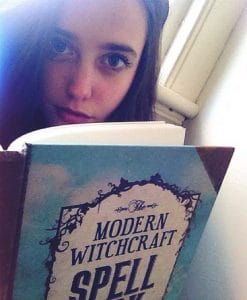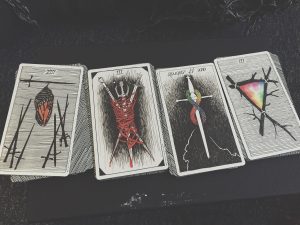By Claire Latsko | Newport Area Editor
“The first time I had ever been to Salem I was one year old, and witches kept coming up to me in the baby carriage. Mom got scared because she thought they were casting spells on me, and that I was going to turn into a witch when I was older. Well guess what?” she laughs and then sighs, “The irony.”
Taylor Lovrien may not be your typical college student. Although she grows herbs for spells, prays to different gods and goddesses, spends nights deep in the woods with candles, has lucid dreams that show her the future, and enjoys interacting with the ghosts in her residence hall, she is still a girl who has the right to her faith just as anyone else does. Freedom of religion extends to paganism, and contrary to popular belief, she is not a devil worshipper. Taylor is a witch that reverently connects herself to nature through Wiccan practice, and loves every second of it.
Watts 301 is a narrow but cozy single dorm room with slanted ceilings and built-in shelves c ontaining books such as Wiccapedia, Herbology, Book of Gypsy Magic, and Spells for the Modern Witch. There is a wide window that looks out over the back lawn. The desk is covered in little trinkets and a large wooden jewelry box overflowing with treasures. A geometric quilt and colorful pillows cover the bed. Above the bed is a blank space where a tapestry once hung, but was, sadly, confiscated by an RA. A glass case sits on a table by the window, overflowing with plants reaching towards the last rays of the day’s sunlight. The room is neat, but cluttered in a lived-in way. Taylor welcomes me in with a big smile; “I’m so happy I get to finally talk to someone about all of this.”
ontaining books such as Wiccapedia, Herbology, Book of Gypsy Magic, and Spells for the Modern Witch. There is a wide window that looks out over the back lawn. The desk is covered in little trinkets and a large wooden jewelry box overflowing with treasures. A geometric quilt and colorful pillows cover the bed. Above the bed is a blank space where a tapestry once hung, but was, sadly, confiscated by an RA. A glass case sits on a table by the window, overflowing with plants reaching towards the last rays of the day’s sunlight. The room is neat, but cluttered in a lived-in way. Taylor welcomes me in with a big smile; “I’m so happy I get to finally talk to someone about all of this.”
Wicca is a duo-theistic pagan religion, and this is what Taylor identifies herself as. “Lately I’ve been turning more towards traditional witchcraft because it lets you make your own rules.” This shift allows Taylor to follow a set of self-prescribed rules instead of a strict doctrine.
In Wiccan tradition one worships both a goddess and a god. The female deity that Taylor looks to is Hecate, the Greek goddess of the night and witches. Cernunos, a horned Celtic god, is the male deity she looks to. “I find him beautiful, honestly, like not to have a god crush or anything.”
She slowly pulls the bottom drawer of her cluttered desk open and reaches into the back and grabs a black cardboard box. The action is careful and ritualistic; I wanted to know what was in that box. On the lid was a hand-drawn design in silver marker. I ask her what the symbol means. “Oh the pentagram! That represents the five elements…water, earth, air, fire, and spirit.”
She lifts off the top and takes out many vials of herbs, and a vial containing something called “black witch’s salt,” which, she says, is a powerful ghost deterrent. There is a smaller box overflowing with different colored crystals. Taylor uses the herbs, that she grew herself, and the crystals for different spells and charms.
Taylor says that Wicca is similar to Hinduism in the sense of karma. “The number one rule for us is whatever you do to others will come back to you three times more than you dished it out.” The way Taylor describes it is with the phrase “immediate judgment.” This rule applies not only to bad actions, but good ones as well. “I really really love doing things for other people, not just to get things in return,” she says, but she does love when the universe acknowledges her for her kind actions.
The last item in the box is a deck of cards, but it isn’t just any old 52-card stack. This is a tarot deck, a set of cards used for divination by not only Wicca, but also anyone that is interested.
“So do you want to do a reading?” she asks me. I tell her sure and we sit across from each other on the floor. She hands me the deck of cards, covered in beautiful hand drawn pictures and tells me to shuffle them while thinking about what I want to know. Having me handling the cards allows my energy to enter into them for an accurate reading. I did as I was told, completely skeptical of what we were doing, and while I shuffled she talked to me about the ghosts in the attic above her room. “Just so you know, if you hear any noises from above, it’s the ghosts,” she said. “It’s so odd…I do want to find a way up to the attic, however, just so I can say ‘Hey guys! I live below you!’”
There are eight seasons in the Wicca calendar, and the year symbolizes the life cycle of the gods and goddesses. Each season has a festival, and individuals can choose what gods and goddesses they want to worship for them. Taylor’s favorite holiday is Halloween, but the Wicca tradition refers to it as Samhain. “It is similar to the Mexican Day of the Dead.” Taylor says that during Samhain you have a supper with the dead and honor your ancestors. It is a night of remembrance and a chance to look back on the year because Samhain marks the end of the Wicca calendar.
Last Samhain, Taylor told me that she decided to go crazy with the rituals, “I got ultra traditional.” She prepared plenty of food, and had a vigil in the forest near her home in Brooklyn, Connecticut. Alone in the woods, in the dead of night, with only a few candles, Taylor performed the rites of the ceremony, and then asked her great grandparents, who were very in touch with nature when they were growing up, to step forward and make their presence known.
“I’m out in the middle of the woods, in the middle of the night, and I just see these little eyeballs from behind the candlelight,” she says, “It was a doe and a buck just standing there and I was like ‘Oh my god, hi, nice to meet you guys.’” When interacting with spirits in this way, Taylor doesn’t feel any fear. “I felt honored.”
“Shuffle them until you feel like they’re ready, like they’re saying stop.” I finish shuffling and we split the deck into four piles. She flips the top four cards over one at a time, explaining the meaning between each. As she starts reading the cards my jaw drops in astonishment. Everything she was telling me the cards were saying matched up perfectly with what I wanted to know. If I was skeptical before, I wasn’t now.
Taylor found paganism between 5th and 7th grade from a girl at her school, Ivy. “She was the first pagan I had ever met, and it was the first time that I had ever heard of witches outside of a story book.” As Ivy taught Taylor more and more about witchcraft, Taylor realized that this was something that she could seriously identify herself with because of the deep-rooted connection to nature that Wicca have.
Her mom was unsure at first about Taylor’s new religion. “At first they thought it was just a phase.” Taylor’s single, very Catholic, mother formed a negative connotation around her daughter’s new interests, thinking that witches were bad and only casted spells and hexes to hurt people. Eventually, though, Taylor started showing her mom more and more of her life, and she came to accept Taylor’s views. She even helps Taylor prepare for festivals now.
When she is not celebrating traditional Wicca holidays, Taylor utilizes a special ability. “I have this gift where I have dreams of places before I see them.” Taylor remembers dreaming of coming to Newport when she was younger. “I dreamed of looking out of these windows…I dreamed of that white church downtown.” She says that dreams like this give her a feeling of lucidness. “As soon as I get into that dream, as soon as I start to fall asleep I know. It’s like ‘okay I need to take note of everything that’s happening around me’ because this could be something having to do with my or somebody else’s future.” She keeps a dream journal where she records what happens and draws pictures as well.
Taylor’s main hobbies all stem from creativity; she writes, draws, paints, and does graphic design. Her dream job is to design book covers when she is older. The Salve Regina Art Department, Taylor says, is a place on campus where she can be completely open about her religion, and the faculty welcomes her with no judgment.
The main point that Taylor tries to stress is that, “We don’t worship the devil! We have a choice. Just like we have a choice to harm or to help people.” She does admit that there are witches that do worship the devil, but she is not one of them. “People need to stop generalizing about witches based on what they see on the news.” Taylor finds it disappointing how stereotypical people can be.
My reading is over, and I am feeling hope for the near future more than I ever thought I would. The tarot cards spoke of happiness that will soon come, and Taylor convinced me that it was going to happen. I left Watts 301 that night with a smile on my face and took a deep breath of fresh air as I walked back to my dorm. I texted her later to say, “Thank you,” and she replied, “Any time! I hope the cards helped sort things out.” I think Taylor might be that breath of fresh air.
Today, the daughter that her mother once worried about stands in line at the Newport Dunkin Donuts with a smile on her face, thinking about how excited she is to return to Salem for Samhain this year, as she holds her boyfriend’s hand. She wears a lace shirt with a baby pink sweater, jeans, and Toms, her long brown hair pushed over to one side. She blends into Newport just as any other Salve student does. Taylor looks down at herself and then over at her boyfriend, who is wearing a button down with khakis, and laughs out loud. “We look like we just came from church!” she says. After a moment of silence she giggles, “But the best part is that I don’t go to church.”















